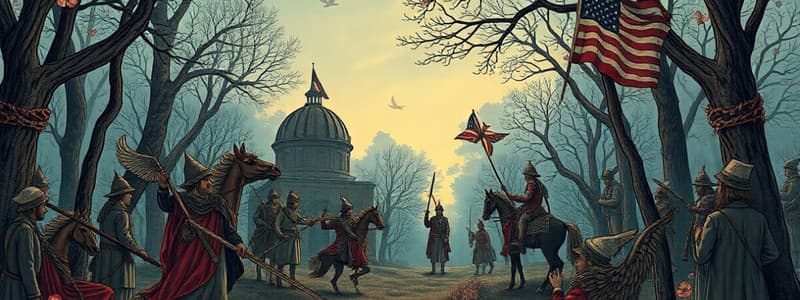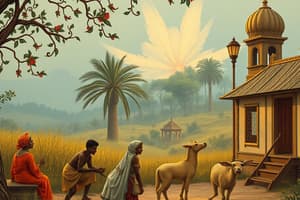Podcast
Questions and Answers
What was the expectation of the British regarding the American colonies after the Seven Years' War?
What was the expectation of the British regarding the American colonies after the Seven Years' War?
- The colonies should take on part of the financial burden. (correct)
- The colonies should reduce their military contracts.
- The colonies should remain financially independent.
- The colonies should increase their trade relations with Britain.
What contributed to the prosperity of the American colonies during the Seven Years' War?
What contributed to the prosperity of the American colonies during the Seven Years' War?
- A decline in British military presence.
- Increase in trade tariffs imposed by Britain.
- A decrease in agricultural production.
- Lucrative military contracts. (correct)
What financial situation did the American colonies experience during the Seven Years' War?
What financial situation did the American colonies experience during the Seven Years' War?
- They faced threats from rival colonies.
- They reduced their consumption of British goods.
- They thrived despite facing additional taxes. (correct)
- They were heavily in debt to Britain.
Which statement accurately describes the financial responsibility expected from the American colonies by the British?
Which statement accurately describes the financial responsibility expected from the American colonies by the British?
Which event significantly impacted the financial expectations of the British towards the American colonies?
Which event significantly impacted the financial expectations of the British towards the American colonies?
What was one primary cause of Pontiac's Rebellion?
What was one primary cause of Pontiac's Rebellion?
How did the British respond to Pontiac's Rebellion?
How did the British respond to Pontiac's Rebellion?
What was the main objective of the Proclamation of 1763?
What was the main objective of the Proclamation of 1763?
What significant change in colonial governance occurred during the Seven Years' War?
What significant change in colonial governance occurred during the Seven Years' War?
What was emerging among the colonists following the Seven Years' War?
What was emerging among the colonists following the Seven Years' War?
Flashcards are hidden until you start studying
Study Notes
American Colonial Expectations
- The British anticipated that American colonies, which thrived during the Seven Years' War, would share the financial burden of increased taxes.
- Colonists sought unfettered access to western lands and developed a growing sense of American identity alongside pride in their British heritage.
Pontiac's War
- Pontiac, an Ottawa leader, united various tribes to resist British expansion into western lands after the war.
- His rebellion led to the overrun of eight British forts and significant unrest in the Great Lakes region.
- The British employed biological warfare by distributing smallpox-infected blankets to the Native Americans.
Proclamation of 1763
- Aimed to minimize conflict between colonists and Ohio Valley tribes by establishing a boundary along the Appalachian Mountains.
- Unlicensed traders and settlers were prohibited from crossing the boundary, although this was largely ignored by colonists.
- British officials negotiated treaties opening large areas of western territories to colonial settlement despite the proclamation.
Sugar Act of 1764
- Marked a significant policy shift aimed at generating revenue rather than just regulating trade.
- Reduced the tax on molasses to encourage compliance while implementing stricter measures against smuggling.
- Funded the costs of maintaining British troops in the colonies.
Stamp Act
- Required special paper or stamps for all legal documents, newspapers, and even playing cards, constituting the first direct internal tax on colonists.
- Sparked significant opposition due to the principle of "no taxation without representation," led by prominent figures like William Pitt.
- Prime Minister George Grenville argued that virtual representation justified the tax.
Colonial Resistance
- The Massachusetts Circular Letter, drafted by Samuel Adams, called for resistance against the Stamp Act, leading to the dissolution of the Massachusetts legislature by royal order.
- A widespread boycott of British goods was organized throughout the colonies, significantly impacting British imports.
- Colonial women contributed to the boycott by forming the Daughters of Liberty, producing homemade goods.
Outcomes from the Boycotts
- The boycott efforts led to a drastic decline in the value of British imports from 1768 to 1769.
- In response to pressure from the colonies, Parliament repealed the Stamp Act except for a tax on tea in 1770.
Boston Massacre
- Tensions escalated in Boston due to the presence of British troops, resulting in a violent confrontation on March 5, 1770.
- Troops fired upon demonstrators, killing five individuals, an event used by patriots Samuel Adams and Paul Revere to fuel anti-British sentiment.
Studying That Suits You
Use AI to generate personalized quizzes and flashcards to suit your learning preferences.




